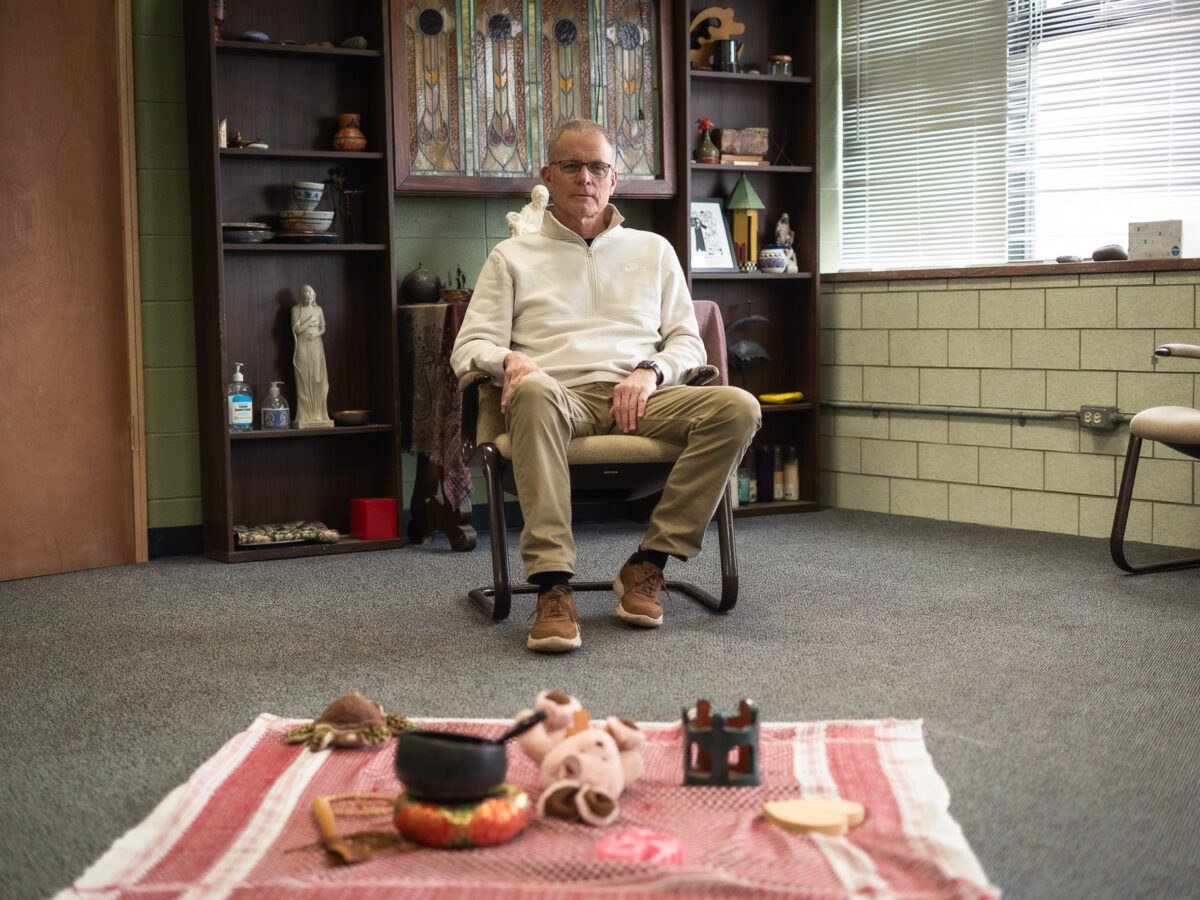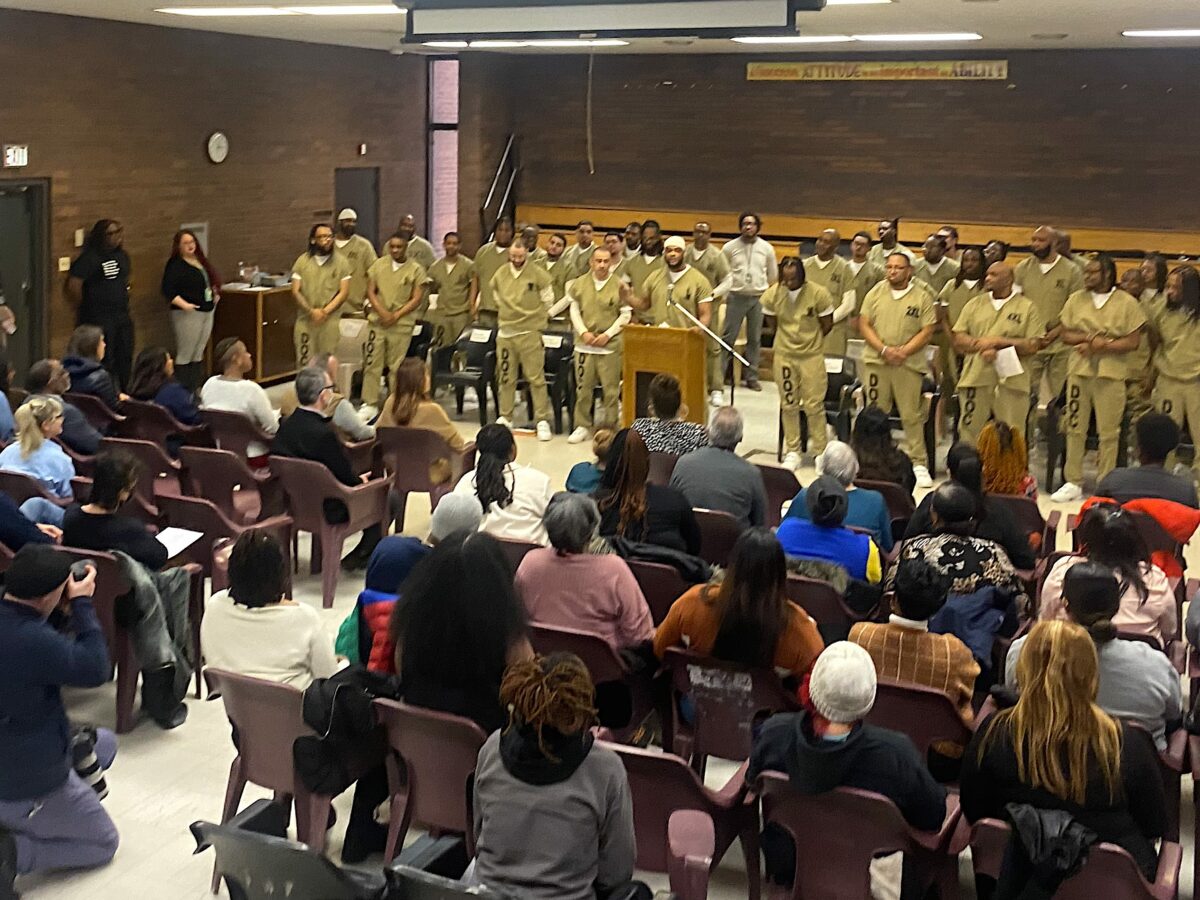On Wednesday, seven people whose loved ones died while being held at Cook County Jail gave testimony at a meeting of the Cook County Board of Commissioners’ Criminal Justice Committee. Family members’ testimony focused their experiences with how the Cook County Sheriff’s Office (CCSO) operated, while representatives from the CCSO discussed policy. Families, along with advocates from the Illinois Network for Pretrial Justice, asked for existing policies to be followed and new requirements for transparency with families and the public on conditions inside the jail.
Martin O’Connor, whose brother Michael died in the jail last Christmas, criticized the way the CCSO handled the situation.
“So what does the sheriff do after my brother’s death?” O’Connor asked. “Well, first, they wait six, eight hours to alert my parents in the middle of the night.” He said as a result, his parents were calling other family members after midnight on Christmas to share the news.
“It can affect you. It can affect your loved one. Your life can change in an instant,” said Maria Bobham, Michael O’Connor’s sister. “It did for me. It did for my little brother.”
In June, Injustice Watch reported that 2023 was a deadly year in the jail: eighteen people died while incarcerated there, the highest mortality rate in at least twenty years. The hearing was called in response to that investigation.
The O’Connors were an exception among the people who testified. According to several other families who testified at Wednesday’s meeting, the CCSO didn’t notify them at all.
“His mother was never notified of his death,” said Timothy Tyler, an attorney for one of the families. “She’s devastated to the point that she can’t even talk about it. Transparency is really important. All she wanted to know was what happened to her son.”
One mother said she found out her son had died via Facebook. “No one called me. No one told me anything,” she said. “That was my only son.”
Her son died after awaiting trial for years. “I hadn’t physically touched my son in seven years,” she said. “And then, when I did get a chance to touch him, his body was cold. He was dead at the morgue. I just, you know, I just hope, you know, God answer my prayers. Whoever ignored my phone? Whoever didn’t take him serious? [There’s God] to answer to.”
After family members testified, CCSO employees shared presentations and answered commissioners’ questions.
8th District Commissioner Anthony Quezada asked, “What is the process of [families] being notified about internal investigations?”
“In 2023 that’s something we identified as a problem, that the communication with the families was not strong enough and not consistent enough,” said Nicholas Scouffas, CCSO’s general counsel. “In response to that, we did hire a specific employee that was a liaison to the families, that reports directly to the criminal investigations unit.”
Asked by Quezada what was the process of notifying the next-of-kin of people who died in the jail, Scouffas said he didn’t know if there was a specific policy. “It’s prompt, I believe,” he added.
After discussion among the CCSO representatives, Dr. Jane Gubser, Executive Director of CCSO jumped in to clarify that the Department of Investigations is supposed to tell families when someone has died.
Cassandra Greer-Lee’s husband Nickolas Lee, “would say, ‘Come on, let’s go,’” coaxing Cassandra to La Rabida Beach on the lakefront to watch the sunrise. “He saw how peaceful it was and how the sun beams when it comes up off the water almost as if it is arising from the water itself.” Lee died in the jail in 2020.
“People will never understand,” Greer-Lee said, “that when you have lost someone in the Cook County Jail, you know that it’s a possibility that your loved one is lying somewhere dead, and you have to find out if they are dead or alive, because you don’t expect to get a call.”
Greer-Lee’s nephew is currently being held at the jail. She said that when a rumor spread that people had died in the part of the jail he’s in, she spent three days trying to confirm whether he was alive. Calls went unanswered or to voicemail, she said. The experience echoed what she’d endured when her husband died.
“Finally, thank God, my nephew called.”
According to Gubser, ten people have died in the jail so far this year. “In 2024 we had two natural deaths, one overdose, one death by suicide, one homicide, one person classified as homicide prior to prior to being in custody, one accident of non overdose, and three that are awaiting a full autopsy report,” she said.
Timothy Tyler testified on behalf of a grieving mother. “All she wanted to know was what happened to her son,” he said. “He didn’t choose to come into this world with a mental illness. He was born that way. He wasn’t a hardened criminal. He’s a twenty-year-old man who was trying to continue his life, and had the procedures been followed, he’d be alive today.”
As the meeting came to a close, First District Commissioner Tara Stamps spoke.
“My first question is, where is Sheriff Dart?” she asked.
“When the resolution was passed,” Scouffas* responded, “I believe it was requiring that the [CCSO] provide an assessment of the policies and procedures at issue from the deaths occurring in 2000 or 2023 and so we brought the people who know the most about that to this, to this meeting.”
“Thank you for your response and thank you for following up with the wording of the resolution,” Stamps said, “but this is one of the times that I personally would have wanted him to be present to hear the testimony the hearts of the families who have been impacted by the deaths of their loved ones under his care. I think that’s just the level of respect and compassion that personally we can demonstrate, and that doesn’t have to be legislated.”
That moment will stay with Greer-Lee.
“Oh my God, when Tara Stamps said what she said, the tears just flow,” she said. “That really meant something to me, and I appreciate her saying that.”
In Illinois, prisons and jails are required to report in-custody deaths to the state; the Illinois Criminal Justice Information Authority makes some information from reports public the following year. The CCSO does not publicly report in-custody deaths. Greer-Lee said she intends to continue campaigning for policy changes.
“The Illinois Network for Pretrial Justice calls on the board to work with us and other county stakeholders, to craft an ordinance to require full transparency and accountability around how the Cook County Sheriff provides for the health and safety of the people incarcerated,” she said.
At Christmas, and on days like today, Greer-Lee said she asks her husband’s spirit to give her strength. “I pray, and I think about the life that we could have had together,” she said.
“That’s what makes me keep fighting.”
*Correction, 1/6/2025: A previous version of this article incorrectly attributed this statement to Jesus “Manny” Estrada, Chief Operating Officer of Cermak Health Services.
Micah Clark Moody has researched pretrial jailing systems in Michigan, Los Angeles, and Chicago.





